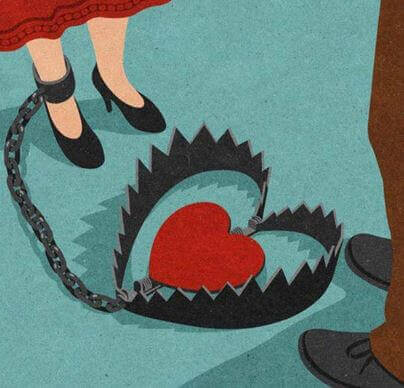Codependency and How it Ruins Relationships and our Self-Esteem

Codependency is when we are so dependent on another person that it becomes an addiction. This can occur in couples, and also within the family, for example, between a mother and daughter. Whatever the context, in relationships where there is a clear dependence, the dependent person feels that he needs the other just to be able to continue living. We are talking here about a psychological dependence which is very tied to our emotions.
In this sense, dependence goes beyond the mere desire to be with someone. It is more to do with thinking that the other person is essential and irreplaceable, and that they are linked to our well-being. Their presence in our lives becomes an absolutely necessary condition for us to be able to feel good. It is a need that we must satisfy in any way we can in order for us to obtain happiness.
Emotional dependence often goes hand in hand with jealous behavior. By the use of manipulation or possession of the beloved person, we wear the other person down. The other person usually ends the relationship, and the end result is that the irrational belief of dependency comes true i.e. without you I am nothing.
On other occasions, it isn’t only one person dependent on the other, but rather both are dependent, only in different ways. We have here is what we call emotional codependency. In a codependent relationship there is a dependent member whose happiness depends on their partner being by their side and not abandoning them. On the other hand, their partner is also dependent, but this dependency is on the dependence of the partner!
Codependency or altruism?
To make things clearer: the dependent person needs their partner and their partner has a need to protect them, and to help and care about their well-being. It is, of course, true that being caring towards our partner is extremely necessary in order to keep the relationship afloat. This, though, needs to be done altruistically, out of love for that person and not to feed an underlying dependence.
The behavior patterns that come from codependency only generate a strengthening of the dependence between the two, and a filling of needs that have not been adequately met in childhood.

By looking after the safety of the other person, protecting them excessively, and taking care of them as if they don´t have the capacity to do it themselves, the dependent partner seems to find strength and meaning and reinforce their self-esteem. In addition, this way of acting is like the water that quenches the thirst of the dependent person. In this way the pieces of the jigsaw fit together perfectly and generate and reinforce the dependency.
A toxic vicious circle forms within the relationship. One’s happiness depends on the other person and, in turn, the happiness of the latter depends on their partner’s need for attachment. It may seem strange, but studies tell us that this is how some couples function.
What is the end result of this dynamic? The codependent couple never experiences a healthy and satisfactory relationship. Suffering and the feeling of emptiness become the main players within the relationship. In the rare cases where the relationship is a lasting one, both people have to endure intense discomfort as they end up losing their own identity.
Symptoms and characteristics of emotional codependency
Although the protective person may seem strong, this is not actually the case. The truth of the matter is that in caring for the partner, they encounter the only way to take care of their own self-esteem. Here’s a summary of the several different symptoms of emotional codependency:
Self-esteem is non-existent
As we said before, codependents usually have low self-esteem that they try to replace with the sensation of usefulness. This usefulness stems from knowing they are of value to another person, in this case their partner.
In many cases, this deficiency began to form in their childhood, in dependencies within their main relationships in their early years. In those relationships they would be rewarded whenever they did something for someone else. From that point on, they learned that their value depended on what they were able to contribute to others.
They seek to control the other person
Because their self-esteem depends on the other person needing them, they tend to use manipulation and control as a way for their “victim” not to escape. To feel valuable and useful they need the other person to continue to maintain their dependence on them, and they can only ensure this by controlling their partner.
Another common strategy to maintain someone’s dependence on you is to undermine their self-esteem. If you make the other person feel useless and worthless then they need someone to come to their “rescue”. And, of course, that’s when the other person appears and “saves” them, in an apparently selfless and sacrificial way.
They fear the independence of the other
When they realize that the other person has undertaken some sort of independent action, such as making a decision alone, they panic. They then work frantically to try and “restore” the situation to how it was. Therefore, it is not uncommon for them to leave what they are doing in order to “help” the other person. In this way they continue to maintain their superior position as the protector of the other.
They fear that the other person will achieve things alone and realize that they do not really need anyone’s help. Or, that the other person may realise that there are other people, apart from the dependent, who can help.
They are obsessed with their partner
As far as they are concerned, they should be constantly supervising their partner. In this way, they become obsessive, and end up losing their own identity. They believe that making their partner’s life easier is the only mission they can obtain well-being from. On top of that, if they make any mistake when doing this they find it difficult to forgive themselves and get filled with frustration.

They have too much need for approval
The approval we get from other people is often a valuable source of information to monitor our own development. However, when we base all our self-esteem on the information we receive then that can be a problem. In this sense, codependents have a great need for approval that they try to cover up without often worrying about how they do it. And who better to give immediate approval than the dependent person?
They feel responsible for the other person’s emotions
Although we know that other people’s emotions don’t belong to us, we can often feel responsible for how others feel. We shouldn’t be surprised at this because that is the way we have been brought up.
We have often heard phrases like these: “Don’t make Dad angry with you”, “If you do that Mum will be upset”. However, this idea is much more prevalent in codependent people. They think that the other person feels good or bad because of how they have acted. Because of this they often end up carrying responsibilities that aren’t theirs to carry. They also feel guilt for things that have nothing to do with them.
They often blame their partner
One one hand, these people need to feel useful helping their partner or someone else who is dependent on them. However, the moment the other person does something that goes against their ideas, they tend to throw it in their face or blame them. This is a strategy to make the other person feel bad and to make them change their behavior.
“With everything I do for you and this is the way you repay me” is a very common expression in these situations. “You just don’t know how much I sacrifice for you” or “I’ve given up everything just to make you happy” are others. Can you identify with this in any way? Even though these situations may surprise us, it is more common than we could imagine.
And so, if you feel that you are in some way involved in a relationship like this then you need to analyze what is going on. Give your self-esteem a chance and dare to experience a healthy relationship!
Bibliographic references
Mellody, P., Wells, A., Miller, K., Codependence : what it is, where it comes from, how it sabotages our lives. Learn to face it. Paidós Ibérica. 2005.
Mazzarello, R., Study on codependency and its influence on psychosocial risk behaviors. University of Barcelona.
Codependency is when we are so dependent on another person that it becomes an addiction. This can occur in couples, and also within the family, for example, between a mother and daughter. Whatever the context, in relationships where there is a clear dependence, the dependent person feels that he needs the other just to be able to continue living. We are talking here about a psychological dependence which is very tied to our emotions.
In this sense, dependence goes beyond the mere desire to be with someone. It is more to do with thinking that the other person is essential and irreplaceable, and that they are linked to our well-being. Their presence in our lives becomes an absolutely necessary condition for us to be able to feel good. It is a need that we must satisfy in any way we can in order for us to obtain happiness.
Emotional dependence often goes hand in hand with jealous behavior. By the use of manipulation or possession of the beloved person, we wear the other person down. The other person usually ends the relationship, and the end result is that the irrational belief of dependency comes true i.e. without you I am nothing.
On other occasions, it isn’t only one person dependent on the other, but rather both are dependent, only in different ways. We have here is what we call emotional codependency. In a codependent relationship there is a dependent member whose happiness depends on their partner being by their side and not abandoning them. On the other hand, their partner is also dependent, but this dependency is on the dependence of the partner!
Codependency or altruism?
To make things clearer: the dependent person needs their partner and their partner has a need to protect them, and to help and care about their well-being. It is, of course, true that being caring towards our partner is extremely necessary in order to keep the relationship afloat. This, though, needs to be done altruistically, out of love for that person and not to feed an underlying dependence.
The behavior patterns that come from codependency only generate a strengthening of the dependence between the two, and a filling of needs that have not been adequately met in childhood.

By looking after the safety of the other person, protecting them excessively, and taking care of them as if they don´t have the capacity to do it themselves, the dependent partner seems to find strength and meaning and reinforce their self-esteem. In addition, this way of acting is like the water that quenches the thirst of the dependent person. In this way the pieces of the jigsaw fit together perfectly and generate and reinforce the dependency.
A toxic vicious circle forms within the relationship. One’s happiness depends on the other person and, in turn, the happiness of the latter depends on their partner’s need for attachment. It may seem strange, but studies tell us that this is how some couples function.
What is the end result of this dynamic? The codependent couple never experiences a healthy and satisfactory relationship. Suffering and the feeling of emptiness become the main players within the relationship. In the rare cases where the relationship is a lasting one, both people have to endure intense discomfort as they end up losing their own identity.
Symptoms and characteristics of emotional codependency
Although the protective person may seem strong, this is not actually the case. The truth of the matter is that in caring for the partner, they encounter the only way to take care of their own self-esteem. Here’s a summary of the several different symptoms of emotional codependency:
Self-esteem is non-existent
As we said before, codependents usually have low self-esteem that they try to replace with the sensation of usefulness. This usefulness stems from knowing they are of value to another person, in this case their partner.
In many cases, this deficiency began to form in their childhood, in dependencies within their main relationships in their early years. In those relationships they would be rewarded whenever they did something for someone else. From that point on, they learned that their value depended on what they were able to contribute to others.
They seek to control the other person
Because their self-esteem depends on the other person needing them, they tend to use manipulation and control as a way for their “victim” not to escape. To feel valuable and useful they need the other person to continue to maintain their dependence on them, and they can only ensure this by controlling their partner.
Another common strategy to maintain someone’s dependence on you is to undermine their self-esteem. If you make the other person feel useless and worthless then they need someone to come to their “rescue”. And, of course, that’s when the other person appears and “saves” them, in an apparently selfless and sacrificial way.
They fear the independence of the other
When they realize that the other person has undertaken some sort of independent action, such as making a decision alone, they panic. They then work frantically to try and “restore” the situation to how it was. Therefore, it is not uncommon for them to leave what they are doing in order to “help” the other person. In this way they continue to maintain their superior position as the protector of the other.
They fear that the other person will achieve things alone and realize that they do not really need anyone’s help. Or, that the other person may realise that there are other people, apart from the dependent, who can help.
They are obsessed with their partner
As far as they are concerned, they should be constantly supervising their partner. In this way, they become obsessive, and end up losing their own identity. They believe that making their partner’s life easier is the only mission they can obtain well-being from. On top of that, if they make any mistake when doing this they find it difficult to forgive themselves and get filled with frustration.

They have too much need for approval
The approval we get from other people is often a valuable source of information to monitor our own development. However, when we base all our self-esteem on the information we receive then that can be a problem. In this sense, codependents have a great need for approval that they try to cover up without often worrying about how they do it. And who better to give immediate approval than the dependent person?
They feel responsible for the other person’s emotions
Although we know that other people’s emotions don’t belong to us, we can often feel responsible for how others feel. We shouldn’t be surprised at this because that is the way we have been brought up.
We have often heard phrases like these: “Don’t make Dad angry with you”, “If you do that Mum will be upset”. However, this idea is much more prevalent in codependent people. They think that the other person feels good or bad because of how they have acted. Because of this they often end up carrying responsibilities that aren’t theirs to carry. They also feel guilt for things that have nothing to do with them.
They often blame their partner
One one hand, these people need to feel useful helping their partner or someone else who is dependent on them. However, the moment the other person does something that goes against their ideas, they tend to throw it in their face or blame them. This is a strategy to make the other person feel bad and to make them change their behavior.
“With everything I do for you and this is the way you repay me” is a very common expression in these situations. “You just don’t know how much I sacrifice for you” or “I’ve given up everything just to make you happy” are others. Can you identify with this in any way? Even though these situations may surprise us, it is more common than we could imagine.
And so, if you feel that you are in some way involved in a relationship like this then you need to analyze what is going on. Give your self-esteem a chance and dare to experience a healthy relationship!
Bibliographic references
Mellody, P., Wells, A., Miller, K., Codependence : what it is, where it comes from, how it sabotages our lives. Learn to face it. Paidós Ibérica. 2005.
Mazzarello, R., Study on codependency and its influence on psychosocial risk behaviors. University of Barcelona.
All cited sources were thoroughly reviewed by our team to ensure their quality, reliability, currency, and validity. The bibliography of this article was considered reliable and of academic or scientific accuracy.
- Mellody, P., Wells, A., Miller, K., La codependencia: qué es, de dónde procede, cómo sabotea nuestras vidas. Aprende a hacerle frente. Paidós Ibérica. 2005.
- Mazzarello, R., Estudio sobre la codependencia y su influencia en las conductas de riesgo psicosocial. Universidad de Barcelona.
This text is provided for informational purposes only and does not replace consultation with a professional. If in doubt, consult your specialist.







